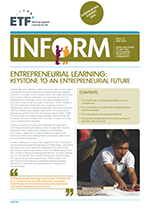INFORM - ISSUE 16 - Entrepreneurial learning: Keystone to an Entrepreneurial Culture
 INFORM - ISSUE 16 - Entrepreneurial learning: Keystone to an Entrepreneurial Culture
INFORM - ISSUE 16 - Entrepreneurial learning: Keystone to an Entrepreneurial Culture
Increasingly open markets, volatile economies and concerns about unemployment are the backdrop to a dialogue among European Union (EU) countries on how governments, the private sector and civic society meet the challenges of competitiveness and jobs. Addressing this challenge, the EU has made entrepreneurship promotion a top priority (European Commission, 2010). Integral to the EU’s entrepreneurship drive is encouraging countries in neighbouring regions undergoing significant institutional and policy reforms to adopt more strategic approaches to entrepreneurial learning across their education and training systems (European Commission, 2006). This forms part of a wider support package, which includes the European Training Foundation (ETF) services, to help economies to be competitive and inclusive.
This policy briefing considers the challenges and potential of promoting entrepreneurial learning more strategically. Primarily targeted at policy makers from transition and emerging economies, it argues for a model of lifelong entrepreneurial learning in which policy development and systemic reforms are benchmarked and assessed.
A major challenge is to ensure full engagement and ownership of the entrepreneurial learning agenda by all stakeholders, particularly education authorities, backed by leadership from within those authorities to see through reforms. Given the relative newness of the concept of lifelong entrepreneurial learning, this policy briefing points to the pivotal role of teachers and argues that borrowing from good practice makes good sense. Building value in an evolving policy area requires cooperation between strategic partners from the public and private sectors, including civic interest groups. Download INFORM - ISSUE 16.








/https%3A%2F%2Fprofilepics.canalblog.com%2Fprofilepics%2F1%2F0%2F1076071.jpg)